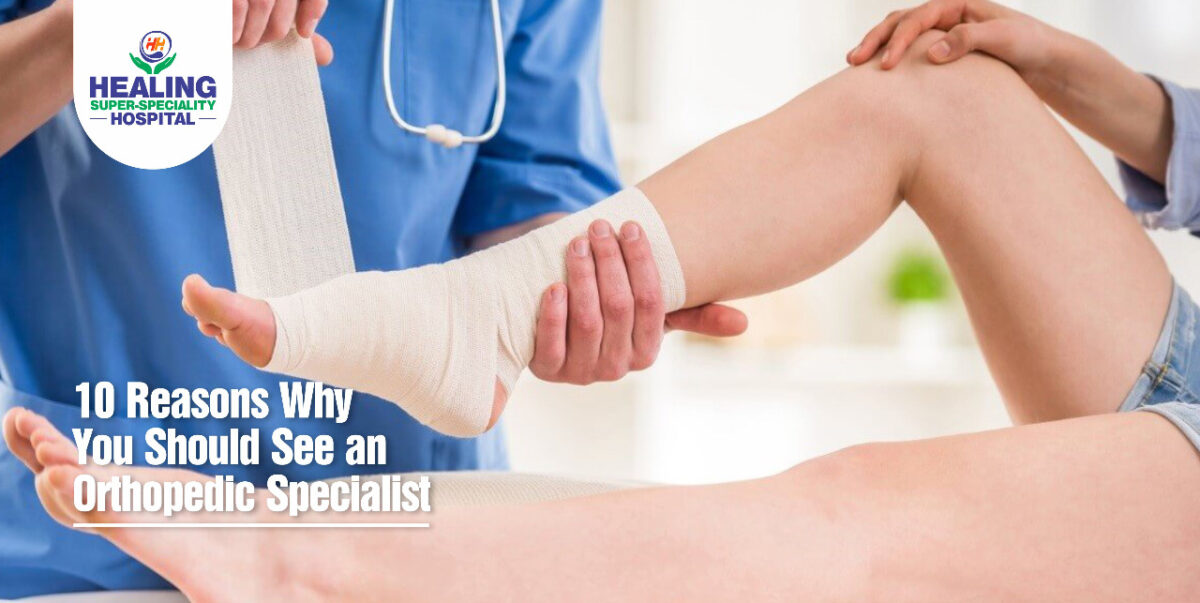Orthopedic specialists are doctors who specialize in the musculoskeletal system’s wellbeing. The key responsibilities of an orthopedic specialist include providing diagnosis, treatment, and preventive advice for musculoskeletal diseases and accidents.
Here are 10 reasons why you should see an orthopedic specialist:

- Knee Pain: Pain may occur in any part of the knee joint, kneecap, ligaments, tendons, and cartilage. Factors such as extreme exercise and obesity can aggravate knee pain. A diagnostic test is normally needed for knee pain in order for the doctor to assess the type and severity of the injury.
The orthopedic specialist will then prescribe treatment after determining the cause of the knee pain. It is important to get knee pain checked as knee injuries once left untreated may have long-term repercussions.

- Back Pain: The majority of adults today experience back pain. Why is that so? There are many reasons for this problem, the most important one being a sedentary lifestyle. The modern lifestyle has led people to a lot of diseases and problems. Apart from that, lifting large weights, growing age, and bad posture are also potential causes of back pain.
Generally, back pain lasts only a few days or weeks, but if yours lasts more than a few weeks, booking an appointment with an orthopedic specialist in Chandigarh is highly recommended.
- Hip Pain: Hip pain refers to the discomfort felt in or near the hip joint. It may not always be felt in the hip, but rather also in the groin or the thigh. Rest, pain relievers, and ice or heat can help if hip pain is mild.
However, if the pain persists, consult an orthopedic specialist. Medical attention is especially required if you recently endured an accident, have arthritis or other such problems.
- Shoulder Pain: Shoulder pain, swelling, and reduced range of motion may be caused by arthritis, dislocation, and injuries. Shoulder pain that lasts more than 2 to 4 weeks, or pain that includes swelling or discoloration, should be checked by an orthopedic doctor.
Remember that sudden shoulder pain can also indicate a heart attack. If you feel this kind of pain, call the emergency helpline number immediately.
Also Read: https://healinghospital.co.in/orthopaedic-problems-in-childhood-best-ortho-doctor-in-chandigarh/
- Sciatic Pain: Sciatica is a form of low back pain that radiates down the leg and into the foot. The most common cause behind it is slipped disc. In most cases, the pain will subside with time. However, if sciatica pain persists for more than six weeks, you should consult an orthopedic specialist.
- Frozen Shoulder: Frozen shoulder is a condition in which the shoulder gets stiff. The movement gets painful in such a case and one can find it difficult to lift the arms or move them. A specialist in orthopedics may diagnose frozen shoulder and recommend treatments such as gentle exercises, heat, medication or surgery.
- Arthritis Pain: Osteoarthritis is characterized by severe joint pain, stiffness, and a restricted range of motion. The breaking down of the protective cartilage in one or more joints causes arthritis. Consulting an orthopedic specialist can help patients with such a problem.
- Joint Replacement: Total joint replacement entails removing a portion or all of a damaged joint and replacing it with artificial implants. The most popular joint replacements are hip and knee replacements, but replacement surgery may also be done on other joints.
You should opt for a joint replacement surgery if any of your joints give you discomfort during everyday activities when other therapies don’t work.
Book an appointment with the best orthopedic specialist in Chandigarh: https://healinghospital.co.in/orthopedic/
- Restrictive Motion: A limited range of motion that isn’t caused by an apparent acute injury may be a sign of a more severe underlying health problem. An orthopedic surgeon will conduct a thorough examination to identify the cause of your disability and help you get back on your feet.
- Tingling or Numbness in the Arms or Legs: Arthritis, carpal tunnel syndrome, or nerve damage are common causes of numbness and tingling in the hands. If you’re diabetic, numbness and tingling in your legs or feet can be signs of diabetic neuropathy. In all such cases, you should not wait to make an appointment with the orthopedic doctor.
























